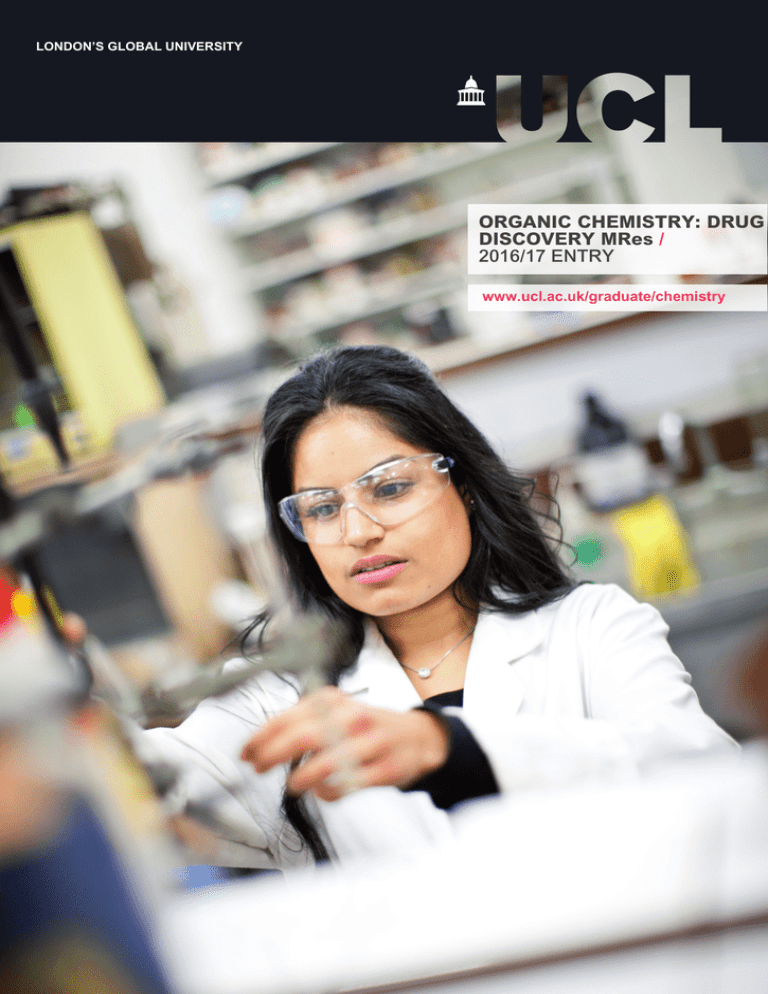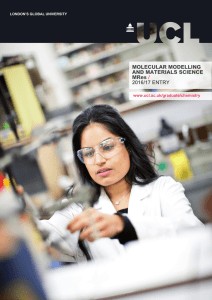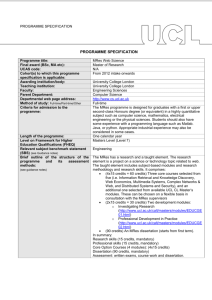ORGANIC CHEMISTRY: DRUG DISCOVERY MRes / 2016/17 ENTRY
advertisement

LONDON’S GLOBAL UNIVERSITY ORGANIC CHEMISTRY: DRUG DISCOVERY MRes / 2016/17 ENTRY www.ucl.ac.uk/graduate/chemistry Organic Chemistry: Drug Discovery MRes / The Organic Chemistry: Drug Discovery MRes at UCL offers students the opportunity to follow an integrated course of research and interdisciplinary study. Students gain an outstanding training in synthetic organic chemistry applied to drug design, together with a breadth of experience in several areas of synthetic methodology and chemical biology. Degree summary The programme provides a thorough foundation in drug design, advanced organic synthesis and molecular modelling, together with modules on research techniques, professional development and entrepreneurship. Students will carry out a substantial research project on organic/medicinal chemistry or chemical biology over a ten-month period. // This programme is taught in collaboration with the Wolfson Institute of Biomedical Research (WIBR) which brings together scientists and clinicians from both academic and pharmaceutical industry backgrounds. The institute's strength is in its multidisciplinary approach to research, with the goal of identifying novel targets for drug development. The programme is delivered through a combination of lectures, problem classes, workshops and projects. Assessment is through unseen written examination, coursework, project reports and presentations. Degree structure Mode: Full-time: 1 year MRes students undertake modules to the value of 180 credits. The programme consists of two modules from the Wolfson Institute for Biomedical Research (30 credits), one Master's level Chemistry module (15 credits) two transferable/research skills modules (30 credits) and the research project (105 credits). CORE MODULES // Research Skills // Scientific Literature // Research Rotation Project (see below) OPTIONAL MODULES // Select two modules from the Wolfson Institute for Biomedical Research: // Bioinformatics // Target Identification // Cheminformatics // Biological Molecules // Biophysical Screening // Fragment Based Drug Design // Target Selection (Scientific) // Target Selection (Commercial) // Plus one M level Chemistry module: // Principles of Drug Design // Biological Chemistry // Stereochemical Control in Asymmetric Synthesis // Synthesis and Biosynthesis of Natural Products DISSERTATION/REPORT // Students will undertake a laboratory-based research project lasting ten months. An interim report is submitted after five months, and at the end of the project each student writes a dissertation, gives a short presentation and has a viva voce examination. Your career The MRes has been developed in response to the needs of the pharmaceutical and biotechnology sectors for highly qualified students as leaders in the discovery of new medicines. The pharmaceutical sector is a major employer in the UK and high-quality graduates with an understanding of the sector are always in demand.Our recent graduates have taken up PhD positions, are working in industry and have entered teacher training. Entry requirements A minimum of a second-class Bachelor's degree in a relevant discipline from a UK university or an overseas qualification of an equivalent standard. English language proficiency level If your education has not been conducted in the English language, you will be expected to demonstrate evidence of an adequate level of English proficiency. FEES AND FUNDING // UK & EU (2016/17) entry: £8,225 (FT) // Overseas (2016/17) entry: £22,180 (FT) Students can be self-funded or find sponsorship from funding agencies such as research councils, the European Union, industry or charities. There are also a number of Graduate School Scholarships and departmental bursaries and prizes available. The level of English language proficiency for this programme is: Standard. Full details of funding opportunities can be found on the UCL Scholarships website: www.ucl.ac.uk/scholarships Information about the evidence required, acceptable qualifications and test providers is provided at: www.ucl.ac.uk/graduate/english-requirements APPLICATION DATE Your application CONTACT All applicants: 29 July 2016 Jadranka Butorac The deadline for all applicants is 29 July 2016. Students are advised to apply as early as possible due to competition for places. Those applying for scholarship funding (particularly overseas applicants) should take note of application deadlines. When we assess your application we would like to learn: // why you want to study Organic Chemistry and Drug Discovery at graduate level. Please elaborate on the motivational factors that have drawn you to our subject. Our experience is that applicants from many different first-degree backgrounds participate in the programme and you should explain how your own background leads you to this MRes. // why you want to study Organic Chemistry and Drug Discovery at UCL. Tell us how UCL can help to improve your career path and what you can bring to the programme // how your academic background meets the demands of this challenging programme. The MRes is a broadening degree which will lead you into areas that lie outside your first-degree subject. How comfortable are you with that? // what would you like to be able to do following your MRes? Together with essential academic requirements, the personal statement is your opportunity to elaborate on your reasons for applying to this programme and how your interests match what the programme will deliver. Details on how to apply are available on the website at: www.ucl.ac.uk/graduate/apply PDF Updated: May 25, 2016 Information correct at time of going to press. See website (www.ucl.ac.uk/chemistry) for latest information Email: pgcourses.chem@ucl.ac.uk Telephone: +44 (0)20 7679 4650


